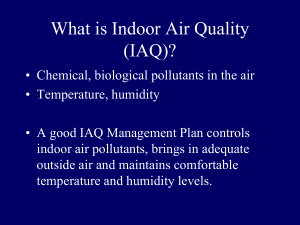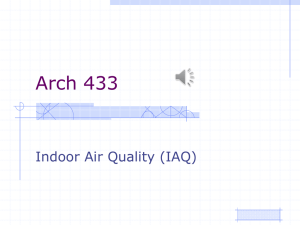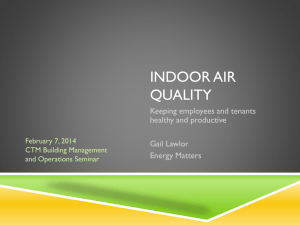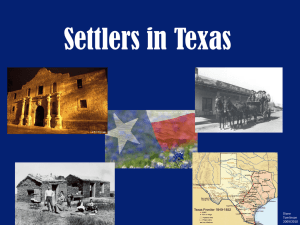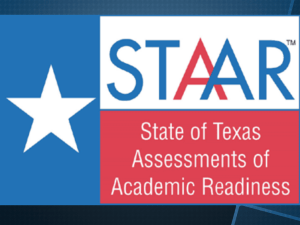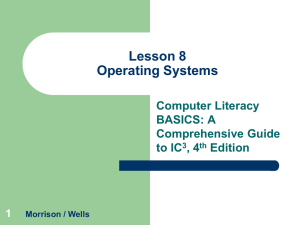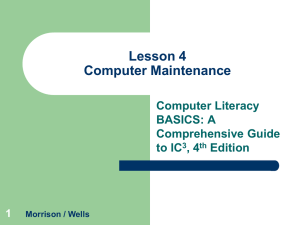IC3 Calculator_3.6.1 - Energy Systems Laboratory
advertisement
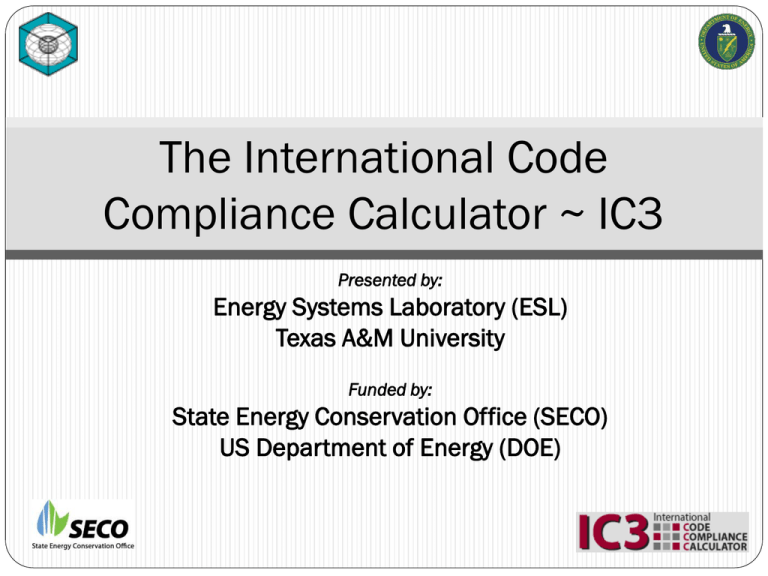
The International Code Compliance Calculator ~ IC3 Presented by: Energy Systems Laboratory (ESL) Texas A&M University Funded by: State Energy Conservation Office (SECO) US Department of Energy (DOE) Special thanks to: Felix Lopez Senior Engineer 2 Presenters: Katherine McKelvey Texas A&M’s Energy Systems Laboratory 3 Engineering Research Associate since 2007 City of Fort Worth Chief Residential Inspector for 11 years ICC Certified State of Texas Plumbing Inspectors’ License Master Sign Electrician License Successful completion of Home Energy Rater Training Presenters: Ed Dryden Building Official, City of Arlington, TX 24 years experience in municipal code enforcement Certified Building Official & other ICC Certifications Contracted with Energy Systems Laboratory to teach workshops in Commercial Energy Code and IC3 4 Energy Systems Laboratory Part of the Texas A&M University System (TAMU) A division of the Texas Engineering Experiment Station (TEES). A research arm of the colleges of Engineering and an engineering agency of the State of Texas providing over half a billion dollars in research annually. 5 Energy Systems Laboratory • Specializes in managing energy efficiency related projects Industrial Assessment Continuous Commissioning® Equipment Testing Legislative responsibilities for the Texas Emissions Reduction Plan (TERP) 6 Energy Systems Laboratory Continuous Commissioning® 7 Energy Systems Laboratory Equipment Testing Services 8 Texas Emission Reduction Plan (TERP) • Established by 77th Texas Legislature in 2001, through enactment of Senate Bill 5 Assures that the air in Texas is safe to breathe • Develops approaches to solving environmental problems • Funds research and development • Establishes Texas Building Energy Performance Standards • 9 Texas Emission Reduction Plan (TERP) • Texas Building Energy Performance Standards • Assigned the Energy Systems Laboratory (ESL) to: • Help municipalities and counties determine 10 the relative impacts of local amendments to the code • Report the status and effect of energy & emissions as impacted by local codes Texas Emission Reduction Plan (TERP) • Texas Building Energy Performance Standards • Assigned the Energy Systems Laboratory (ESL) to: • Help municipalities and counties determine 11 the relative impacts of local amendments to the code • Report the status and effect of energy & emissions as impacted by local codes Energy Systems Laboratory http://esl.eslwin.tamu.edu/reports/builders-information.html 12 Texas Emission Reduction Plan (TERP) • Texas Building Energy Performance Standards 13 • Sets the 2000 International Residential Code and the 2000 International Energy Conservation Code (IECC) with the 2001 Supplement, as the first state mandated energy codes for the State of Texas Texas Emission Reduction Plan (TERP) • Texas Building Energy Performance Standards •2000 International Residential Code as applicable for 1- and 2- family residential construction •2000 International Energy Conservation Code with the 2001 Supplement for use in all other residential, commercial, and industrial construction. 14 Texas Emission Reduction Plan (TERP) Texas Building Energy Performance Standards • Designed to save energy by: • Reducing solar heat gain • Improving the performance of HVAC ducts • Requiring openings in the thermal envelope to be sealed against air leaks • Setting minimum insulation levels for thermal envelope assemblies 15 Texas Emission Reduction Plan (TERP) Texas’ Nonattainment and Near Nonattainment Areas 16 Texas Emission Reduction Plan (TERP) Municipalities or counties may adopt local amendments to the International Energy Conservation Code and the energy efficiency chapter of the International Residential Code, however these amendments may not result in less stringent energy efficiency requirements in nonattainment areas and affected counties. 17 Energy Systems Laboratory • Developed a series of web-based calculators allowing Texas Government and Building Industry users to design energy efficient buildings at or above code, thus documenting their emissions reductions • International Code Compliance Calculator (IC3) was developed for residential new construction • Many jurisdictions mandate the use of IC3 18 Software Development • International Code Compliance Calculator (IC3) Based on the Texas Building Energy 19 Performance Standards A performance-based residential energy code compliance tool Designed specifically to be used in residential construction within the state of Texas International Code Compliance Calculator – IC3 • Developed with emphasis on simplicity • ESL’s goal is to develop an easy-to-use, easy-to-access simulated performance based tool that could be used to show code compliance and to report reduced energy consumption to the US EPA 20 Let’s Get Started!... The first thing you need to do is type http://ic3.tamu.edu in your browser 21 IC3 First Page 22 IC3 Registration Page 23 IC3 Login Page 24 IC3 My Page 25 IC3 My Page ~ Links 26 IC3 My Page ~ Projects Delete and Copy 27 IC3 - Project Information 28 IC3 - Project Information 29 IC3 - Project Information 30 IC3 - Project Information 31 IC3 Floors 32 IC3 Floors - How Many? 33 IC3 Floors – First Floor 34 IC3 Floors – Floors 35 nd 2 and rd 3 IC3 Floors ~ Bedrooms and Foundation 36 IC3 Windows 37 IC3 Windows – SHGC and UFactor 38 IC3 Windows – Window Sizes 39 IC3 Insulation / Mechanical 40 IC3 Insulation / Mechanical Conditioned Space 41 IC3 Insulation / Mechanical Blower Door 42 IC3 Insulation / Mechanical Duct Blaster 43 IC3 Insulation / Mechanical Wall Insulation 44 IC3 Insulation / Mechanical Wall Finish 45 IC3 HVAC/DHW 46 IC3 HVAC/DHW – Heating 47 IC3 HVAC/DHW – Cooling 48 IC3 HVAC/DHW – Water Heater 49 IC3 Roof 50 IC3 Roof – Roof Covering and Radiant Barrier 51 IC3 Roof – Ceiling Area 52 IC3 Roof – Ceiling Area 53 IC3 Horizontal Projections 54 IC3 Status 55 IC3 Energy Certificate 56 IC3 Energy Checklist 57 Questions and Answers ESL’s Contact information IC3 Support Ic3_support@esl.tamu.edu Katherine McKelvey (979) 845-1781 Kmckelvey@tamu.ed u 58 Thank you for attending! ESL- Energy Systems Lab: http://esl.eslwin.tamu.edu/ Ed Dryden Ed.Dryden@arlingtontx.gov SECO- State Energy Conservation Office: http://www.seco.cpa.state.tx.us/ Felix Lopez Felix.lopez@cpa.state.tx.us DOE- Department of Energy: http://www.energy.gov/ EPA- Environmental Protection Agency: http://www.epa.gov/ 59
